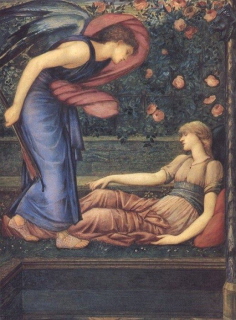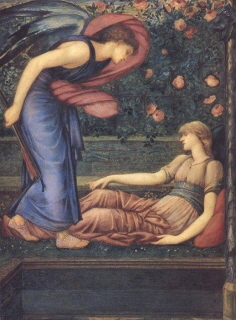Part VII Of How To Bring Myths & Fairy Tales Back From The Dead & Into The Light: Lewis’ TILL WE HAVE FACES
So, Orual changes Psyche’s life and her own by forcing her sister, by threat of killing Psyche and herself rather than let Psyche continue living under a delusion (as Orual sees it), to light a lamp and see who her husband really is.
As in the fairy tale, this changes everything. Psyche is forced to wander, and Orual loses her sister most decisively. The lovely valley of the god is gone.
Orual becomes Queen. She is actually brave and wise and actually rules quite well. She assures a successor (whom she marries to Redival) and brings peace and prosperity to Glome. She grows to old age, her face continually veiled, her faithful Bardia helping her in her queenly duties. Her beloved counselor, the Fox, dies, and a restlessness and haunted dissatisfaction weighs on Psyche. She decides to travel. In doing so, she happens upon the temple of the goddess Istra. The statue of the goddess has a black veil about the head.
Istra is Psyche’s birth name.
Orual hears from the priest the tale of the goddess, and realizes it’s her and Psyche’s story, but as told in the myths as we’re familiar with them. To Orual, it’s an offensive lie. It paints her a jealous of Psyche, and her destroyer.

This is the catalyst for Orual’s writing down her narrative, her proof that the gods are cruel, deceptive, malicious, and unjust.
But the narrative itself—the writing down of her story—is the catalyst for Orual discovering her true face…and the truth. The first part of the narrative ends with Orual’s complaint to the gods and her documenting that she received no answer from them.
She concluded this too hastily.
The gods do, in fact, answer. Quite remarkably and vividly, though not in appearing themselves and not in words.
The second part, an absolutely amazing bit of characterization, a moving bit of self-discovery, and a fiction writing tour de force, shows the way the gods deal with Orual. It’s grace. It’s divine intervention. They bring into her path people who touched her life, witnesses to who she really was and is, and she begins to glimpse what her real life story really was—not the life story concocted by a self-deceived Orual.
And what does she find?
- • She was cruel to Redival, whom she first loved, then loved less, then loved not at all, transferring her attention and affection to the Fox, and then Psyche.
- • She was a “devourer” and destroyer —like Ungit—of those she claimed to love: the Fox, Bardia, Psyche.
- • She expected total loyalty and self-sacrifice, like Ungit, and she had the power of life and death as queen, like a god.
And then the gods send Orual visions.
The visions. Lewis uses them to depict the trials of Psyche from the original myth—the sorting of the grains, the obtainment of golden fleece, etc. But he transmutes them. Here, they are Orual’s trials in visionary form. It is Orual suffering and laboring. And it is Orual who is defined as “Ungit”, for she sees herself in a mirror looking like the fearful stone image. Ultimately, she is called to the courtroom, where the gods will answer her complaint against them.
In a marvelously constructed and dread-inducing scene, Orual reads her true self in her true voice into the courtroom assembly. And, without the gods answering one single word, she has her answer. The answer was in knowing herself, speaking in her real voice what her real desires and motivations had been. The story of Istra as the priest told it turns out, ironically, to have truth: Her jealousy led to Psyche’s terrible loss and testing. She is the destroyer. The devourer. Ungit. And there, where she sees the faces of Bardia and The Fox, she asks for forgiveness.
The Fox now becomes her guide in the underworld (think of Dante and Virgil), but it is time for more truth and more grace. We learn that Psyche is now a goddess, yes, and Orual has taken Psyche’s suffering upon herself in the visions, lessening her sister’s ordeal.
Orual receives the beauty—of soul—that she sought from Istra/Psyche. Later, she dies understanding the truth of herself and the gods. Understanding that the Lord is himself the answer. Job learned this, too, centuries before Orual’s time.
And there you have it, a myth brought to new life, and a retelling that can lead a soul to seek new life. Yes, it’s that powerful. And it’s that powerful because of the voice, the insights into human behavior, and changing the crucial elements of a well-known tale so that it retains the tale, yes, but is a thing wholly new as well. And better than the original.
I would add that any writer seeking to write on spiritual issues needs to read this novel. I would add that for a Christian speculative fiction writer, this novel is part of the canon: It’s essential reading. I cannot express in my own words the power of it, especially the second part. And why should I, when Lewis got it right. Read his words.
What saddens me is that a Christian (i.e. “CBA”) publisher wouldn’t have published this. It doesn’t speak specifically of Christ. It speaks of gods. It depicts an underworld suitable for a Homerian saga. I doubt they would get beyond those. And yet, the spiritual truth here is so evident and luminous and profound, coupled as it is with the marvelous characterization of Orual, that we see a conversion journey that is not clichéd, that isn’t even Christian while being indisputably Christian. It’s brilliant.
Any Christian publisher who would have turned this book down because of mythic content is a myopic publisher. And any Christian reader who bypasses a book set in a pagan setting without any Christian characters as not being Christian and being “heathen”, is not just myopic, but an idiot.
God speaks in this book, to Orual and to us.
And that’s what I want to do. Write stories that have power and that contains the voice of God, and that have the wonder and magic of the speculative genre, and that are not just Bible verses stuffed in the mouths of simplistic characters who don’t have the convoluted depths of real people struggling against their own worst and toward better inclinations.
I have been Orual in part one. Parts of that still linger in me. And I’m Orual in part two. And I want to die scribbling, like her, that the Lord is all the answer I need.
I’m off the next two weeks here at Speculative Faith. Holidays and all.
If you’ve got a burning desire to write a two or three parter on any subject that suits this blog, drop me a line. I’d be happy to feature something interesting on my Friday spot.
Merry Christmas. May God bless you all and all your loved ones this holiday season. Remember to thank the Father through the Spirit for the gift of the Son. He is the only reason for any season, not just this one.
See you in 2007.





































